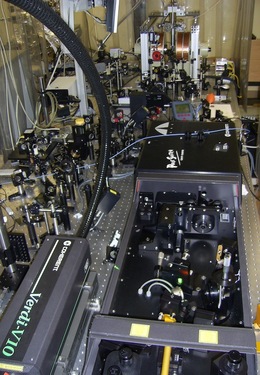- Brescia
- Interdisciplinary Laboratories for Advanced Materials Physics (I-LAMP)
- Ulysses
- Instrumentation
Instrumentation

Ulysses laboratories intragrate the modern ultrafast laser sources with the traditional optical spectroscopic techniques. We are currently able to investigate the non-equilibrium electron dynamics in solid-state and bilogical systems through high resolution time- and frequency-resolved optical spectroscopies.
Our facilities...
OPTICS
Pharos by LIght Conversion + Parametric Amplifier
- infrared/visible wavelength tunability
- 40 fs pulse duration
- Rep. rate tunable from 400 kHz to single shot
- Nireos interferometers for broadband pump-probe and 2D spectroscopy
Cavity dumped Ti:sapphire oscillator
- 700-950 nm wavelength tunability
- 120 fs pulse duration
- Rep. rate tunable from 1.8 MHz to single shot
- 60 nJ/pulse energy
White-light continuum generation through photonic fiber
- 450-1600 nm wavelength tunability
- pulse characterization
- high-speed array detection for simultaneous time and frequency resolution
MenloSystems ASOPS
- 780-1560 nm wavelength output
- 100 MHz repetition rate
- 120 fs pulse duration
Optical spectrum analyzer
- 350-1750 nm wavelength range
- 0.05 nm maximum resolution
- -75-20 dBm measurement level range
THz generation and detection
- 0.5-4 THz frequency range
- ZnTe electro-optical sampling
- pump-THz probe spectroscopy at low temperature
OTHER EQUIPMENTS
Time-resolved magneto-optics
- Double lock-in configuration
- 50 kHz Photoelastic modulator
Electromagnet
- 1.2 T maximum magnetic field
Cryogenics
- Open-cycle cryostat, 4.5 K minimal temperature
- Closed-cycle cryostat, low vibrations, 10 K minimal temperature, equpped for low-temperature transport measurements
- Reflectivity and transmissivity measurement configurations
MICROSCOPY
Atomic Force Microscopy
- 1 AFM microscope operating in the frequency modulation mode (FM-AFM)
- 1 AFM microscope operating in the amplitude modulation mode (AM-AFM).
Scanning-probe Near-field Optical Microscopy
- 1 SNOM, working simultaneously in collection mode, reflection mode and transmission mode.
